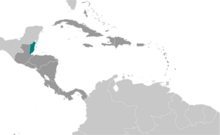LGBTQ rights in Belize
LGBTQ rights in Belize | |
|---|---|
 | |
| Status | Criminalized since 2003. |
| Penalty | 10 years imprisonment (Homosexuals are prohibited immigrants) |
| Gender identity | - |
Lesbian, gay, bisexual, and transgender (LGBT) persons in Belize face legal challenges not experienced by non-LGBT citizens. Same sex sexual activity is illegal in Belize.
Foreign homosexuals are prohibited from entering Belize.
Issues
Illegality of same-sex sexual activity
According to Section 53 of the Belize Criminal Code, "Every person who has carnal intercourse against the order of nature with any person ... shall be liable to imprisonment for 10 years."[1]
Law against LGBT entry to Belize
Under Section 5(1) of the Immigration Act, "... [T]he following persons are prohibited immigrants – ... (e) any prostitute or homosexual or any person who may be living on or receiving or may have been living on or receiving the proceeds of prostitution or homosexual behaviour...."[2]
Legal protections
The U.S. Department of State's 2011 human rights report found that,
The law does not protect sexual orientation or gender identity. The criminal code states that "carnal intercourse" with any person "against the order of nature" shall receive a punishment of 10 years' imprisonment. In practice[,] the law was interpreted as including only sex between men. The extent [in 2011] of discrimination based on sexual orientation was difficult to ascertain due to lack of reporting instances of discrimination through official channels. United Belize Advocacy Movement (UNIBAM), the country's sole lesbian, gay, bisexual, and transgender advocacy organization, reported that continuing harassment and insults by the general public and police affected its activities, but its members were reluctant to file complaints. There were no gay pride marches organized during the year due to UNIBAM membership concerns over the public's possible adverse reaction.[3]
LGBT rights movement in Belize
Pressure from the United States
In December 2011, United States President Barack Obama criticised nations that persecute homosexuals.[citation needed] In response, Belizean Prime Minister Dean Barrow reiterated that Belize would not change its laws.[4] He argued that the issue is one for Belize to deal with and if the U.S. wanted to punish states by removing foreign aid for continuing such practice, then "they will have to cut off their aid".[4]
Judicial challenge
In September 2010, the United Belize Advocacy Movement (UNIBAM) and its executive director Caleb Orosco jointly filed a case in the Supreme Court of Judicature of Belize challenging the constitutionality of the anti-homosexual laws with the support of the International Commission of Jurists, the Commonwealth Lawyers' Association, and the Human Dignity Trust.
The Catholic and the Protestant churches reacted negatively to this, saying that same-sex marriage would be next.[5][6] On 3 December 2011, the Council of Churches organized a "Take a Stand" rally to oppose the UNIBAM case.[7]
Counsel for the Church Interested Parties (CIP) (consisting of the Roman Catholic Church, the Belize Church of England Corporate Body, and the Evangelical Association of Churches) argued in January 2012 that UNIBAM had no standing to bring the case because, as an organization, it has no constitutionally guaranteed rights. Relying on Section 20 of the Belize Constitution, the court sided with CIP on 27 April 2012.[8]
Quoting the 2007 case Belize Telecom Ltd. et al. v The Attorney General of Belize and Belize Telemedia Ltd., Justice Michelle Arana stated that "[a]part from [instances when a person is detained] no representative action can be brought to enforce the rights protected in Sections 3 to 19 of the Constitution". Despite precedent from courts in Zimbabwe and Bangladesh, the justice did not allow UNIBAM to bring an action on behalf of its members.[8] In December 2012, Justice Arana granted UNIBAM "interested party" status, which is the same status given to CIP.[9]
The case was heard by the Supreme Court of Judicature in May 2013,[10] amid violence and death threats received by LGBT activists.[11]
Church opposition to decriminalization
The Belizean Council of Churches held a "Belize Action/Family Forum" rally on 23 November 2011[5] to express its opposition to decriminalization as part of "an orchestrated plan of demonic darkness to dethrone God from our Constitution and open massive gateways to demonic influence and destruction that will affect generation after generation to come".[12]
Summary table
See also
- Politics of Belize
- LGBT rights in the Commonwealth of Nations
- LGBT rights in the Americas
- LGBT rights by country or territory
External links
- Commonwealth Lawyers' Association
- Human Dignity Trust
- United Belize Advocacy Movement
- Dangerous Liaisons. The American Religious Right & the Criminalization of Homosexuality in Belize Southern Poverty Law Center 2013
References
- ^ Belize Criminal Code
- ^ Belize Immigration Act
- ^ 2011 Country Reports on Human Rights Practices: Belize, Bureau of Democracy, Human Rights and Labor, U.S. Department of State, page 16
- ^ a b "Belize Continues to Deny Fundamental Human Rights of Sexual Minorities", Council on Hemispheric Affairs, authored by Robert Works, 17 January 2012
- ^ a b "A long fight to decriminalize homosexuality", Latinamerica Press, authored by Louisa Reynolds, 21 December 2011
- ^ Bowcott, Owen (November 16, 2011). "Global campaign to decriminalise homosexuality to kick off in Belize court". The Guardian. London.
- ^ "Christians 'Take a Stand' Against UNIBAM", 7 News Belize, reported by Jules Vasquez, 5 December 2011
- ^ a b "Supreme Court Claim No 668 of 2010 'Caleb Orozco and UNIBAM v. The Attorney General of Belize'" (PDF). Retrieved 9 July 2012.
- ^ "UNIBAM regains ground in court", 7 News Belize, 5 December 2012
- ^ Global Post. Gay in Belize? You're breaking the law. Still.. Retrieved 1 December 2013.
- ^ The Guardian. Belize gay rights campaigner is facing more death threats, says lawyer. Retrieved 1 December 2013.
- ^ "Decriminalizing homosexuality will have dire ripple effects: churches", Amandala Newspaper
